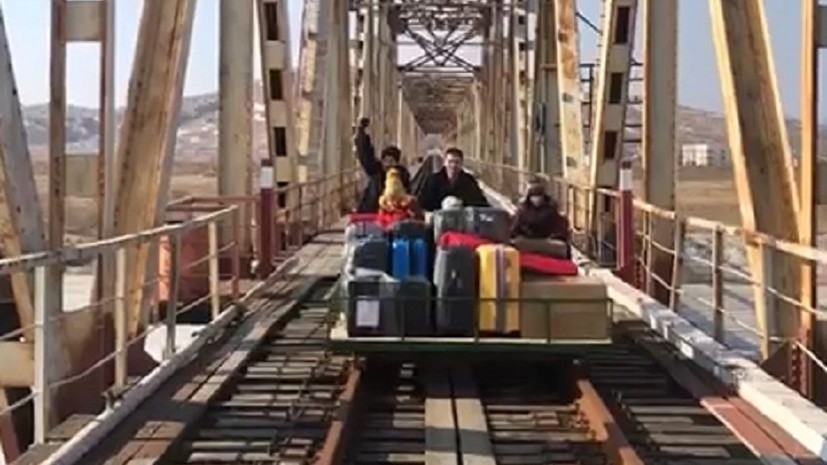Vladislav Sorokin is one of the diplomats who recently returned to Russia from a business trip to the DPRK.
The way home turned out to be long and arduous: 32 hours by train, two hours by bus and a walk to the Russian side.
The video of the last leg of the journey instantly spread across the Internet and went viral, gaining tens of thousands of views.
The fact is that diplomats had to get to the border station on foot by rail, pushing a trolley with suitcases in front of them.
Presidential press secretary Dmitry Peskov, commenting on the video with the Russians, called the diplomatic service hard work.
“Listen, the diplomatic service is very thorny, very complicated, it seems so pretty and elegant, but in fact it is a very difficult, harsh and stressful service,” Peskov said.
In turn, Foreign Ministry spokeswoman Maria Zakharova explained that, oddly enough, for diplomats it was the shortest way home.
This is due to the tough quarantine regime introduced by North Korea: “We have several times asked Pyongyang to help our diplomats, but, unfortunately, this is not the first time when we have to get out of the DPRK in this way.
This is not an attitude towards Russia, but towards the diplomatic corps operating in the country in general.
The main thing is that our diplomats remain optimistic even in such a situation.
The diplomatic service is associated not only with receptions and negotiations in comfortable conditions, but also with such emergencies. "
- Vladislav, you woke up famous today. How does it feel?
- It's just fantastic, of course.
We didn't expect this at all.
- How do you like this format of returning home?
- Nothing extraordinary happened.
In fact, this is the option that we ourselves asked the Korean side.
The DPRK has a quite civilized option of returning through China.
People take a bus to the border, change into a Chinese bus, go through the necessary procedures when crossing the border and go further.
This option did not suit us for various personal reasons.
- Where did you get that very cart? Was it hard to push her?
- The cart was made by specialists of a Russian-Korean enterprise, which is based on the Korean side of the border.
It was sent to us a few days before the departure by our Korean friends.
Pushing her isn't really hard.
Much the same as an airport cart.
- Are you ready to repeat something like that?
- If the Motherland orders, then absolutely.
- How did the children react to this trip?
- It was a great adventure for the children.
If only because since January 2020 we have been living in Pyongyang under conditions of restrictions imposed by the authorities due to the epidemiological situation.
Therefore, the trip to the border, also with a cart, was a real journey for the children.
They were in anticipation, asked how and what would happen.
- How did the Russian border guards react to what is happening?
- You know, they had such faces as if they see these carts every day.
Which, of course, is not true.
They greeted us very warmly.
They helped with things, everything was very fast.
- Tell us a little about yourself.
- My biography is quite usual.
He graduated from MGIMO, his wife too.
They got married right after college.
I worked in the DPRK for three and a half years.
Our daughter was born during this business trip.
- North Korea is a closed country. Tell us about how the fight against coronavirus is being conducted there.
- It was one of the first countries to close borders due to coronavirus infection back in January 2020.
Inside the country, wearing masks is mandatory, and everywhere, even in rural areas.
Disinfection of hands - in any building and transport.
Naturally, a ban on mass gatherings.
North Korean society is very disciplined, so all quarantine measures are strictly enforced.
- Has the work of the Russian diplomatic mission somehow changed in the context of a pandemic?
- Of course it has changed.
Most importantly, there is no rotation of the diplomatic staff - temporarily, of course.
There is also no delegation exchange.
Plus, all quarantine measures were introduced, including restrictions on movement around the country, there was a shortage of some food products.

